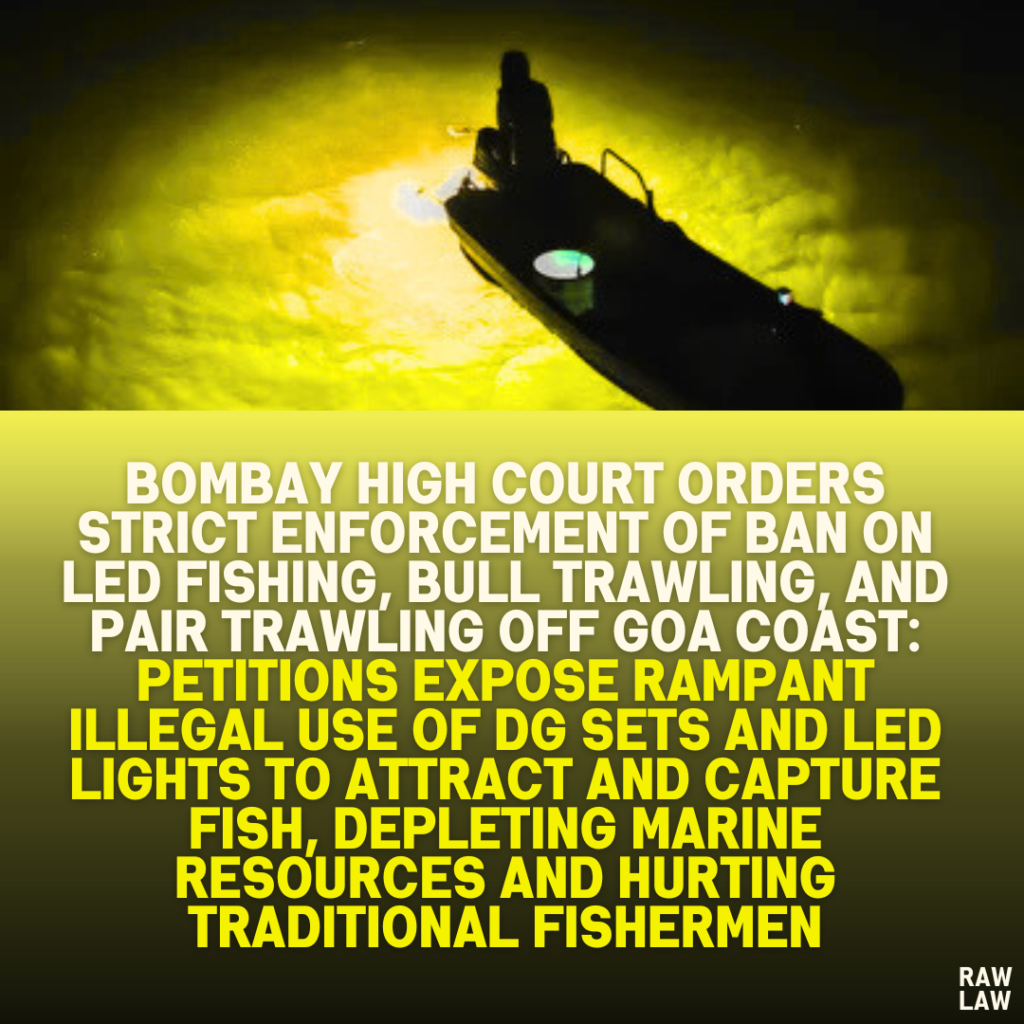Court’s Decision
The Bombay High Court at Goa disposed of Writ Petition No. 403 of 2022 and PIL Writ Petition No. 32 of 2022 by making the Rule absolute in terms of prayer clauses (A), (iv), (v), and (vi) of the PIL, and clauses (A) to (CC) of the Writ Petition. The Court issued comprehensive directions to ensure the enforcement of bans on LED fishing, bull trawling, and pair trawling, holding that:
“There is no enforcement machinery worth the name in place to carry out the statutory duties cast upon the Goa Coastal Police.”
Facts
The petitions were filed to highlight the rampant and illegal practice of LED fishing, bull trawling, and pair trawling off the coast of Goa, despite a statutory ban. The practice involved use of DG sets and LED lights to attract and capture fish, depleting marine resources and affecting traditional fishermen. The State and Central Governments had passed ban orders in 2016 and 2017, respectively, but enforcement remained grossly inadequate.
The Director of Fisheries (DOF) and Indian Coast Guard acknowledged the existence of violations and lack of sufficient infrastructure. The Goa Shipyard Limited (GSL) report, initially suppressed by the DOF, revealed that a significant number of vessels carried DG sets and LED lighting systems without any legitimate need like refrigeration, pointing to their use in banned fishing techniques.
Issues
- Whether the statutory ban on LED fishing, bull trawling, and pair trawling was being effectively implemented.
- Whether DG sets on fishing vessels were being misused for illegal LED fishing.
- Whether the State and Central authorities had fulfilled their duties under applicable laws and the Constitution.
Petitioner’s Arguments
- The petitioners contended that LED fishing and trawling methods were destructive and depleted marine resources, and enforcement was virtually absent.
- They pointed to statutory powers under the Marine Act and the Coast Guard Act requiring enforcement by DOF and the Coast Guard.
- It was argued that DG sets served no legitimate purpose on fishing vessels and were used solely for powering illegal LED lights.
- The Petitioners sought court-monitored directions for enforcement, stricter inspection protocols, and a ban on carrying DG sets unless justified.
Respondent’s Arguments
- The DOF claimed they had undertaken several measures, including patrols and inspections, though resource constraints were acknowledged.
- The Coast Guard argued it lacked statutory power to prosecute violators, though it admitted to handing over 17 offending vessels to DOF.
- The Coastal Police stated they lacked adequate vessels and manpower to patrol the 110 km coastline effectively.
- Fishing cooperatives claimed DG sets were used for auxiliary functions and backup power, and no explicit law prohibited them.
Analysis of the Law
The Court analyzed the Goa Marine Fishing Regulation Act, 1980, and the Merchant Shipping Act, 1958, along with relevant rules and constitutional provisions (Articles 21, 48A, 51A(g), and 297). The statutory scheme empowered various authorities to enforce bans and regulate fishing activities. However, practical implementation was found severely lacking.
The Court emphasized the applicability of the precautionary principle from the decision in M.C. Mehta v. Union of India (1997) and reaffirmed the State’s duty to safeguard marine ecology and food security under Article 21.
Precedent Analysis
The Court relied on the Supreme Court judgment in M.C. Mehta v. Union of India, (1997) 3 SCC 715, to apply the precautionary principle. It reaffirmed that environmental degradation must be prevented even in the absence of scientific certainty, and the burden of proof lies on the actor to demonstrate environmental benignity.
Court’s Reasoning
- The Court found that most inspected fishing vessels carried DG sets without refrigerated holds, suggesting use for powering illegal LED lights.
- The Coast Guard had identified violators but was not empowered to take prosecutorial action.
- The Coastal Police and DOF lacked vessels, manpower, and seriousness in implementation.
- The GSL report clearly established the misuse of DG sets and was initially suppressed, indicating an attempt to mislead the Court.
- Though the Court found a direct correlation between DG sets and illegal fishing, it refrained from banning them due to lack of a specific statutory prohibition.
Conclusion
The Court made the Rule absolute and issued specific directives including:
- Enforcement of the ban by the DOF, with assistance from Coastal Police and Coast Guard.
- Routine inspection of all fishing vessels, with suspension of permits for non-compliance.
- Establishment of a public helpline for reporting illegal fishing.
- Maintenance of detailed inspection logs.
- Implementation of a joint hotline between agencies.
- Enhancing manpower and patrol vessel capabilities.
Implications
This judgment reaffirms the judiciary’s proactive role in enforcing environmental law and sustainable development. It places a binding obligation on State and Central authorities to enforce existing legal bans and uphold Article 21. The case also highlights judicial intolerance towards administrative lethargy and suppression of critical evidence in environmental governance.




Pingback: Bombay High Court Upholds Rule Restricting Tribal Land Sale to Non-Tribals for Agricultural Use — “Protection of Tribal Land Is a Legitimate Constitutional Objective” - Raw Law